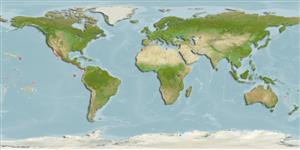Teleostei (teleosts) >
Ophidiiformes (Cusk eels) >
Carapidae (Pearlfishes) > Carapinae
Etymology: Echiodon: Greek, echieys, eos = a little viper + Greek, odous = teeth (Ref. 45335).
More on author: Rosenblatt.
Environment: milieu / climate zone / depth range / distribution range
Ecology
Marine; demersal; depth range 64 - 75 m (Ref. 36487). Tropical
Eastern Pacific: Baja California Sur, Mexico to Panama (Ref. 36487), including the Gulf of California and the Galapagos Islands.
Size / Weight / Age
Maturity: Lm ? range ? - ? cm
Max length : 12.6 cm TL male/unsexed; (Ref. 6347)
Dorsal spines (total): 0; Dorsal soft rays (total): 38 - 42; Anal spines: 0; Anal soft rays: 47 - 50; Vertebrae: 130. Eel-like, shallow body depth; 1 to several symphyseal fangs on dentary and premaxilla; lacking cardiform teeth, pelvic fins, and swim bladder rocker bone; a patch of ridges posteriorly on the ventral surface of the swim bladder (Ref. 34024). Precaudal vertebrae 21-25 (Ref. 34024). Branchiostegal rays: 7 (Ref. 36487).
Uncommon species (Ref. 34024). Free-living adults are found on the outer shelf, usually deeper than 64 m over muddy sand bottoms (Ref. 36487). Oviparous, with specialized vexillifer planktonic larval stage, and benthic tenuis larval stage (Ref. 36487). Maximum depth from Ref. 58018.
Life cycle and mating behavior
Maturity | Reproduction | Spawning | Eggs | Fecundity | Larvae
Oviparous, with specialized vexillifer planktonic stage larva, and benthic tenuis stage larva (Ref. 36487).
Nielsen, J.G., D.M. Cohen, D.F. Markle and C.R. Robins, 1999. Ophidiiform fishes of the world (Order Ophidiiformes). An annotated and illustrated catalogue of pearlfishes, cusk-eels, brotulas and other ophidiiform fishes known to date. FAO Fish. Synop. 125(18):178p. Rome: FAO. (Ref. 34024)
IUCN Red List Status (Ref. 130435: Version 2024-1)
Threat to humans
Harmless
Human uses
Fisheries: of no interest
Tools
Special reports
Download XML
Internet sources
Estimates based on models
Preferred temperature (Ref.
123201): 14.6 - 20.3, mean 17.1 °C (based on 6 cells).
Phylogenetic diversity index (Ref.
82804): PD
50 = 0.5001 [Uniqueness, from 0.5 = low to 2.0 = high].
Bayesian length-weight: a=0.00102 (0.00046 - 0.00225), b=3.06 (2.88 - 3.24), in cm total length, based on all LWR estimates for this body shape (Ref.
93245).
Trophic level (Ref.
69278): 3.5 ±0.5 se; based on size and trophs of closest relatives
Fishing Vulnerability (Ref.
59153): Low vulnerability (10 of 100).
